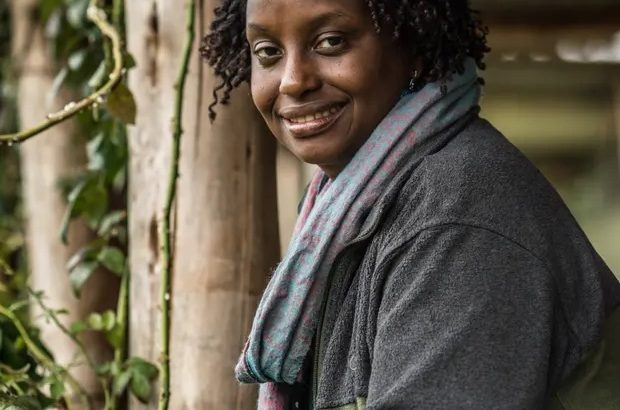SOURCE: The Guardian
When Gladys Kalema-Zikusoka started out there were no black women in her field. She talks about creating roles for African leaders in wildlife and how protecting people is core to protecting the animals they live near
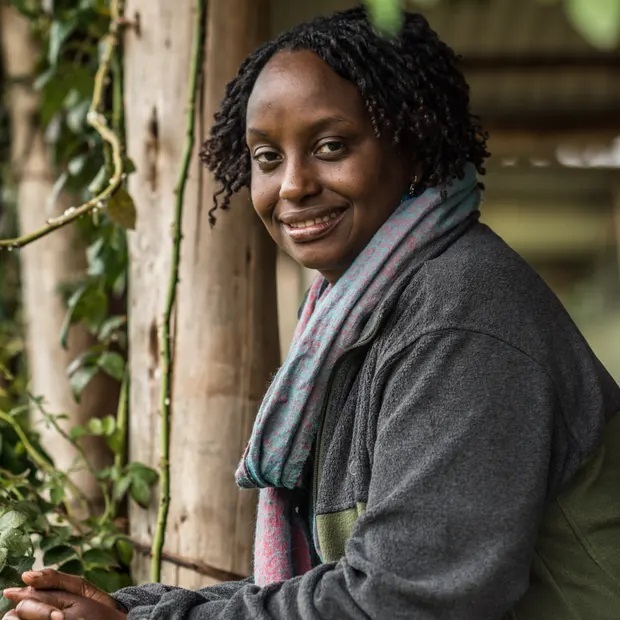
As a black African woman in a space often dominated by white, western males, the path to becoming a conservation leader didn’t always seem open to Gladys Kalema-Zikusoka.
“I remember a warden came to talk to us at wildlife club [at school] about mountain gorillas, which had just been discovered in Uganda and were being habituated. The people involved were white American researchers,” she says.
Kalema-Zikusoka grew up in Uganda’s capital, Kampala, and by 17 was running the wildlife club at Kibuli secondary school in Entebbe, 25 miles (40km) to the south. After graduating from the University of London’s Royal Veterinary College in 1996, she established the Uganda Wildlife Authority’s first veterinary department and became the country’s first wildlife vet.
“I wasn’t sure if this job existed for me,” she recalls. “I didn’t know any wildlife vets in Uganda. When Idi Amin came into power [in 1971], he chased away the British, the Indians and made life very difficult. The people who kept the wildlife going were Africans, but it was a struggle.” Kalema-Zikusoka’s father, who was a minister in the previous government, was one of Amin’s first victims, killed when she was two years old.
When Kalema-Zikusoka became the country’s first wildlife vet it was all the more unusual because she was a woman. “Being a wildlife vet was seen as a very unusual job for a woman. When I started working, there were no female rangers. I was the only woman going out in to the field. People looked at me very strangely.”
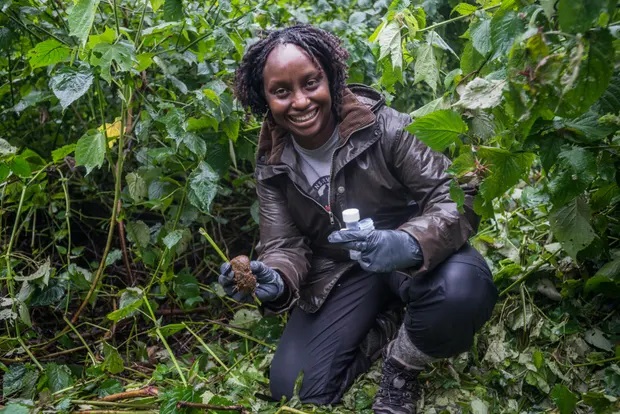
Since then, Kalema-Zikusoka has gone on to found the wildlife charity Conservation Through Public Health (CTPH), the Gorilla Conservation Coffee social enterprise, is vice-president of the African Primatological Society and sits on the leadership council of Women for the Environment Africa.
“There are more Africans involved in conservation than 20 years ago,” she says. “There are still very few women, but it’s better than it used to be. What’s lacking is African leadership. Very few Africans are leading these efforts. We founded the African Primatological Society because of that. I was being invited to conferences to give keynote speeches about primates in Africa and only 10% of people there were from Africa. We had to change that.”
Kalema-Zikusoka is leading on a number of fronts, at home and in the international arena. She is a National Geographic Explorer, a 2021 United Nations Champion of the Earth and a member of the World Health Organization special advisory group for the origin of novel pathogens (WHO SAGO).
There needs to be a homegrown movement of African conservationists and leaders to prevent species declining
“African leaders are better able to meet the needs of the wildlife and people because we have a greater understanding,” she says. “Our relatives had to deal with human-wildlife conflict, or some people’s grandparents were poachers, so we understand the situation better. There needs to be a homegrown movement of African conservationists and leaders to prevent species declining.”
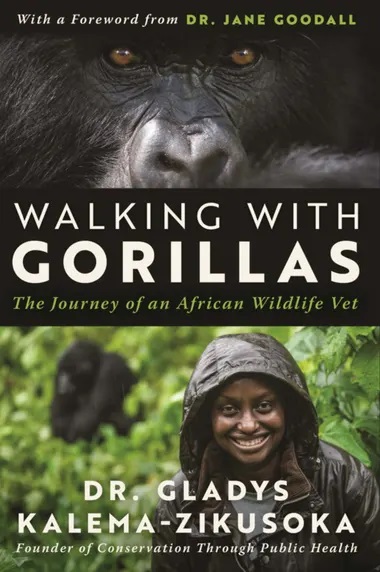
Many charities have snappier names than Conservation Through Public Health, but few “do what it says on the tin”, says Kalema-Zikusoka, whose pragmatic strategy is to protect gorillas and other wildlife by prioritising human health. She first met a mountain gorilla in Bwindi, western Uganda, in 1994, just one of the extraordinary moments in her life recounted in a new memoir, Walking With Gorillas: The Journey of an African Wildlife Vet. “I felt a strong connection,” she says. “I met just one silverback, Kacupira. I also felt they’re so vulnerable, so few in number. I felt we needed to do something to make sure they didn’t go extinct.”
In the 1970s, it was feared the world’s largest primate – found only in the Virunga Mountains that border the Democratic Republic of the Congo, Rwanda and Uganda and in Bwindi Impenetrable national park – would go extinct. But their numbers have been steadily rising, thanks to conservation efforts. The last census, in 2018, counted 1,063. The International Union for Conservation of Nature (IUCN) updated their status from critically endangered to endangered.
“Humans are so closely related to gorillas and chimps, and we can make each other sick,” says Kalema-Zikusoka. “I realised people around the park had very little healthcare – many lived 20 miles from the nearest health centre. Some diseases are preventable with good hygiene, like tuberculosis, scabies … I wanted to set up an NGO that improves the health of the people, because it was difficult to keep gorillas healthy if their human neighbours weren’t healthy and hygienic.”
Tackling poverty is also central to the CTPH mission. “It’s core to protecting wildlife. As long as people are poor and don’t have food, they’re going to want to enter the forest to poach. We found this out during Covid – poaching really increased during the pandemic when there were no tourists.
“After a poacher killed Rafiki, the lead silverback in the Nkuringo group in 2020, we felt we needed to provide fast-growing seedlings to vulnerable people for food – pumpkins, kale, cabbage, beans … Once you give them something to eat, they’re less likely to enter the forest. So food security became another component of our whole model.”
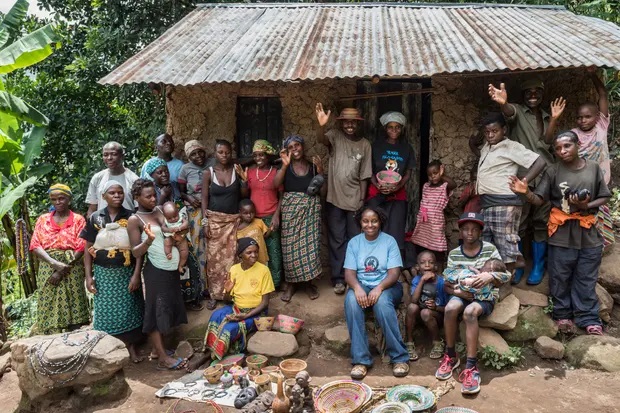
Conservationists face many challenges to stop wildlife disappearing in many parts of Africa. “The biggest issue is habitat loss, which we need to deal with by promoting family planning around protected areas,” says Kalema-Zikusoka. “People were having 10 kids per family on average around Bwindi. By implementing family planning, you reduce poverty and disease. Women have more control over their bodies. And it’s very helpful for wildlife because there’s less need to enter the park to poach. Family planning is an issue all conservation NGOs need to take up.”
Kalema-Zikusoka divides her time between Entebbe, where she lives with her husband and two sons, and Bwindi Impenetrable Forest. Despite being chief executive of CTPH, she still spends much of her time out in the field with the gorillas and local communities. “I’m always there,” she says. “That’s what gives me energy. I’m a very practical hands-on person.”
Walking With Gorillas: The Journey of an African Wildlife Vet by Dr Gladys Kalema-Zikusoka is out now.
Find more age of extinction coverage here, and follow biodiversity reporters Phoebe Weston and Patrick Greenfield on Twitter for all the latest news and features
Thanks for joining us today from Uganda. For decades, the Guardian has amplified voices, studies, scientists and data that point towards irrevocable and catastrophic climate breakdown.
Our reporting has galvanised action, pushed policymakers, and encouraged innovators to seek solutions, even as the crisis deepens. For a world facing an existential threat, this is service – rigorous, provocative and tireless – that we cannot do without. Will you invest in the Guardian today? Think of it as an offset, only one that works.
Unlike many others, we have no billionaire owner, meaning we can fearlessly chase the truth and report it with integrity. We will continue to work with trademark determination and passion to bring you journalism that’s always free from commercial or political interference. No one edits our editor or diverts our attention from what’s most important.
With your support, we’ll continue to keep Guardian journalism open and free for everyone to read. When access to information is made equal, greater numbers of people can understand global events and their impact on people and communities. Together, we can demand better from the powerful and fight for democracy.
Whether you give a little or a lot, your funding will power our reporting for the years to come. If you can, please support us on a monthly basis from just £2. It takes less than a minute to set up, and you can rest assured that you’re making a big impact every single month in support of open, independent journalism. Thank you.
